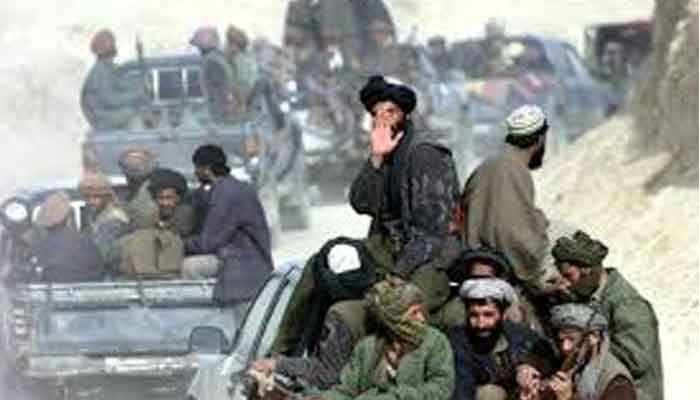Taliban refuse to meet US team in Islamabad
Senior US officials, including Zalmay Khalilzad, former US ambassador and their representative for Afghanistan, are presently in Pakistan for the past two days and want Pakistan to arrange their meeting with the Afghan Taliban in Islamabad.
PESHAWAR: The Afghan Taliban officially announced on Friday that they would not hold any meeting with the US Representative for Afghanistan Zalmay Khalilzad in Islamabad.
“We want to make it clear that we will not hold any meeting with Zalmay Khalilzad inIslamabad,” Taliban spokesman Zabihullah Mujahid said in a brief statement released to the media, killing rumours about their meeting with the visiting US delegation.
Senior US officials, including Zalmay Khalilzad, former US ambassador and their representative for Afghanistan, are presently in Pakistan for the past two days and want Pakistan to arrange their meeting with the Afghan Taliban in Islamabad.
Quoting senior government officials, Pakistan’s mainstream media widely reported that the Taliban had agreed to meet with the US delegation in Islamabad and that they would send their 12-member delegation to Pakistan. The Taliban released this statement to deny reports of their meeting with the US delegation.
There has been a deadlock in peace talks after the two sides reportedly developed differences over agenda of the meeting. The Taliban representatives claimed that they had initiated peace talks with the US to discuss and resolve some of the basic issues first. However, they claimed that in the last meeting that took place in Abu Dhabi in December 2018, the US asked them to announce a two-month ceasefire and also include the Afghan government in peace talks.
According to the Taliban sources, it was decided to hold another meeting in the second week of January 2018 in the Saudi capital city of Riyadh. The Taliban claimed thatthey had chosen their representatives for meeting in Saudi Arabia but then all of a sudden, Saudi Arabia made it conditional that the Taliban leadership would need to announce a two-month ceasefire, which they rejected and announced their boycott of peace talks there.
Meanwhile, senior Taliban leaders said some regional powers, including Pakistan, had approached them and wanted them to meet with the US delegation in Islamabad and also include the Afghan government in the peace process.
The Taliban leaders said they had outright rejected this approach. The Taliban said they had repeatedly explained that they would never hold any meeting with the Afghan government, saying they had not changed their stance. “As we know that the Afghan government doesn’t have the power to make decisions, then why should we waste our time by talking to them,” said one senior Taliban leader.
Pleading anonymity, he said they had also made it clear to the regional powers that they were willing to continue peace talks with the US if they were assured that only three issues would be discussed in the meeting, including US withdrawal from Afghanistan, prisoners’ swap and lifting ban on movement of the Taliban leaders.
-
 Gigi Hadid Feels 'humiliated' After Zayn Malik's 'pathetic' Comment: Source
Gigi Hadid Feels 'humiliated' After Zayn Malik's 'pathetic' Comment: Source -
 Olympics Men Hockey Game: McDavid, Crosby Power Canada Past Czechia
Olympics Men Hockey Game: McDavid, Crosby Power Canada Past Czechia -
 Sony PlayStation State Of Play Reveals 'Castlevania' And 'Metal Gear' Return
Sony PlayStation State Of Play Reveals 'Castlevania' And 'Metal Gear' Return -
 Ontario Tuition Freeze Ends, Allowing Colleges And Universities To Raise Fees
Ontario Tuition Freeze Ends, Allowing Colleges And Universities To Raise Fees -
 King Charles Should Apologise To All Rape Victims, Says New Poll
King Charles Should Apologise To All Rape Victims, Says New Poll -
 Cardi B Shares Emotional Message Amid Stefon Diggs Split Rumors
Cardi B Shares Emotional Message Amid Stefon Diggs Split Rumors -
 James Van Der Beek’s 'heartbroken' Ex Wife Breaks Silence Of His Death
James Van Der Beek’s 'heartbroken' Ex Wife Breaks Silence Of His Death -
 Sarah Ferguson, Shamed Andrew Spotted In ‘family Costume Drama’
Sarah Ferguson, Shamed Andrew Spotted In ‘family Costume Drama’ -
 Kylie Kelce Reveals Why She Barely Planned Her Wedding Day?
Kylie Kelce Reveals Why She Barely Planned Her Wedding Day? -
 Why Shamed Andrew Called His Victims ‘Mrs Windsor’
Why Shamed Andrew Called His Victims ‘Mrs Windsor’ -
 Kate Hudson Explains Why Acting Isn't Discussed At Home
Kate Hudson Explains Why Acting Isn't Discussed At Home -
 Prince William, Kate Middleton Epstein Statement Was AI Generated, Says Expert
Prince William, Kate Middleton Epstein Statement Was AI Generated, Says Expert -
 Sarah Ferguson On Her Way To Hurt 'only Two People Who Care About Her'
Sarah Ferguson On Her Way To Hurt 'only Two People Who Care About Her' -
 World’s Top PC Maker Sounds Alarm Over Memory Chip Shortage
World’s Top PC Maker Sounds Alarm Over Memory Chip Shortage -
 King Charles Is ‘clearly Worried’ Andrew Has Tarnished Royal Image
King Charles Is ‘clearly Worried’ Andrew Has Tarnished Royal Image -
 Royal Family Loses 'loyal' Worker After King Charles Disliked His Work?
Royal Family Loses 'loyal' Worker After King Charles Disliked His Work?




